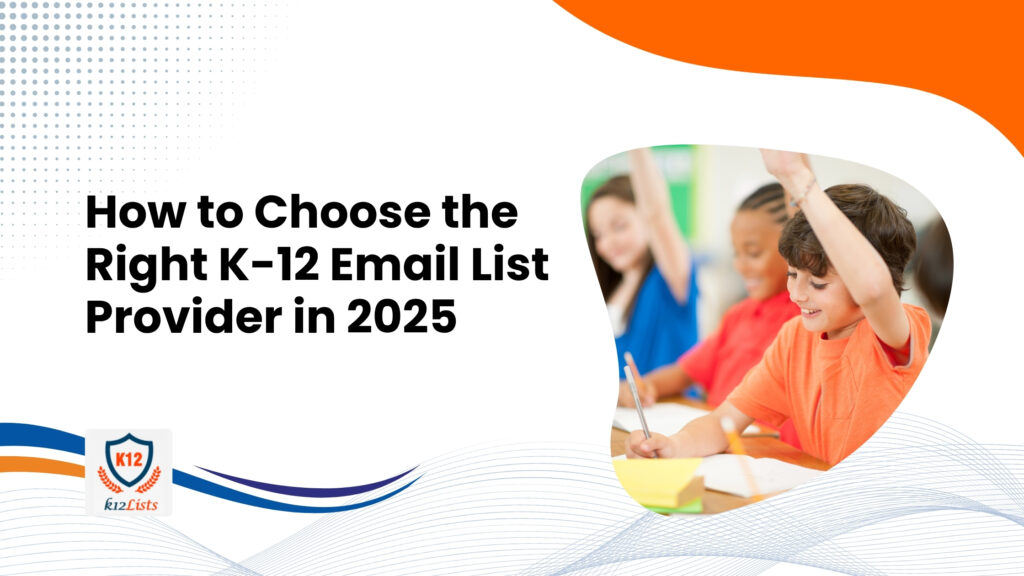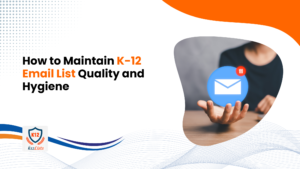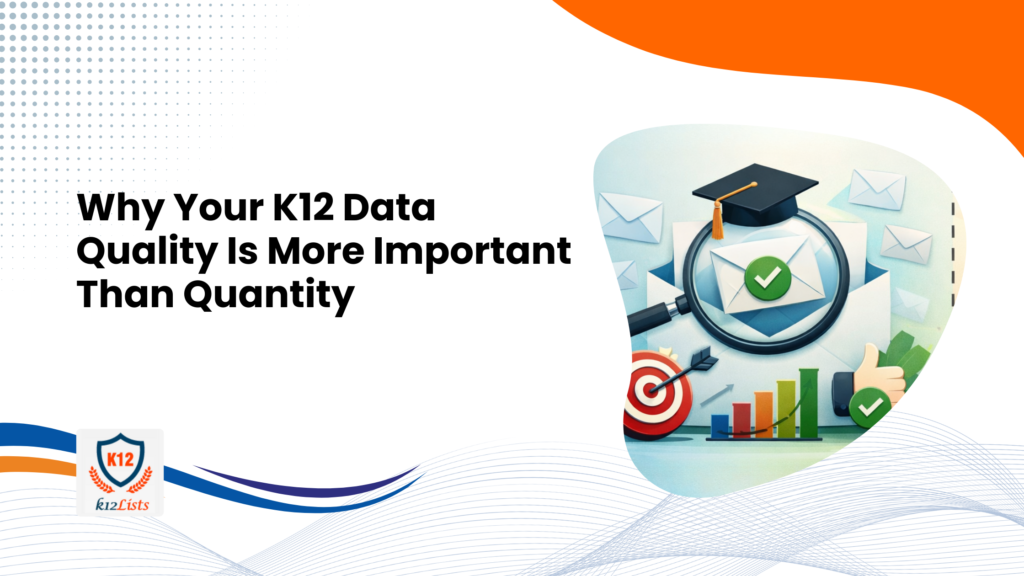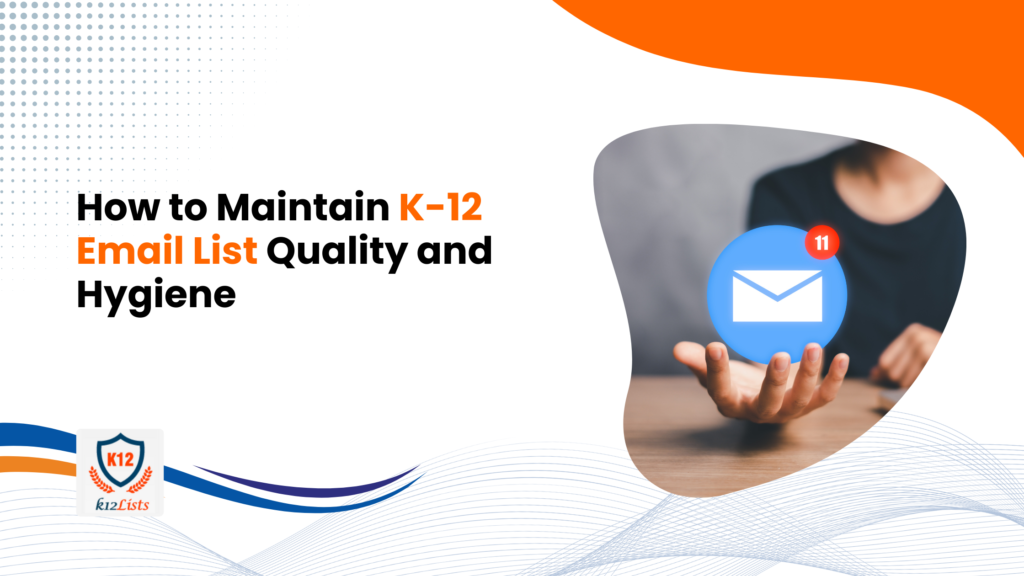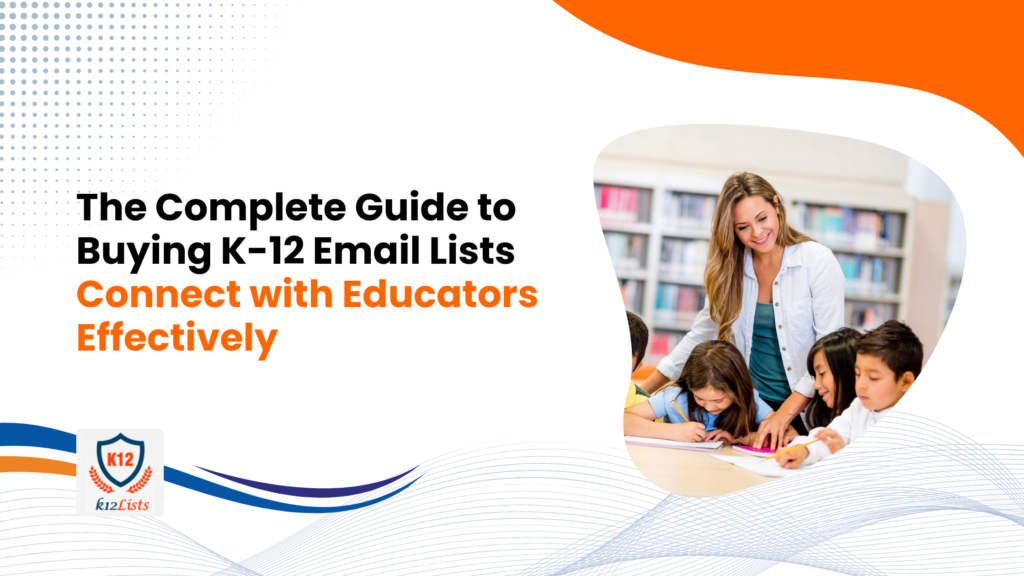In 2025, effectively reaching K-12 education decision-makers – such as principals, superintendents, curriculum directors, and other school leaders is essential for EdTech companies, education publishers, professional development firms, and school vendors. To succeed, it’s critical to choose the right K-12 email list that is highly targeted, up-to-date, and compliant. This ensures your email marketing campaigns connect with the right contacts who influence school purchasing decisions, maximizing your outreach impact and return on investment.
Choosing the right K-12 email list provider is more than buying a list; it’s about securing a strategic partner that helps protect your sender reputation, boost campaign engagement, and comply with education industry regulations.
This comprehensive guide covers what to look for, what questions to ask, and how to evaluate providers as you prepare to buy K-12 contact data in 2025.
Why Your Choice of Email List Provider Matters
In the K-12 market, educators and administrators expect relevant, respectful correspondence. Poorly sourced or outdated lists can result in:
- High bounce and complaint rates that harm your email deliverability.
- Wasted marketing budget on irrelevant or inaccurate contacts.
- Legal risks around data privacy including CAN-SPAM and FERPA compliance.
- Damaged brand reputation with education stakeholders.
High-quality, verified K-12 email databases empower you to choose the right K-12 email list that connects you directly with decision-makers who truly influence school purchasing. These databases offer robust segmentation options by role (e.g., principals, superintendents), geography, school type, and more, enabling your campaigns to be laser-targeted and highly impactful.
6 Critical Factors to Evaluate Data Providers
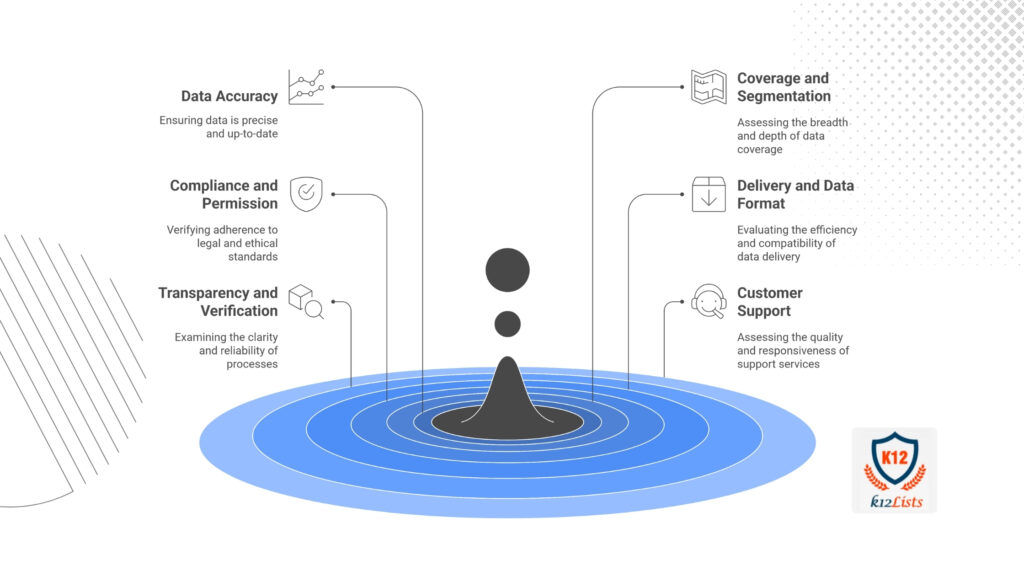
Data Accuracy and Freshness
Top providers continuously verify and update contacts often monthly. They validate emails, track role changes, and remove outdated or inactive contacts. This ongoing maintenance is key to high deliverability and engagement.
Coverage and Segmentation
Look for comprehensive coverage of public, private, and charter schools. The database should include multiple school roles, such as principals, district superintendents, curriculum directors, IT admins, and teacher leads. Robust segmentation by state, district size, and funding type empowers finely tuned marketing.
Compliance and Permission
Ensure the provider complies with CAN-SPAM, FERPA, and other applicable regulations. They should offer transparent usage policies and assist with opt-out management. Legitimate vendors avoid scraped or harvested emails and provide data sourced ethically.
Delivery and Data Format
You want clean files in common formats (CSV, XLS) with all needed fields: contact name, title, email, school, district, phone, and verification status. Sample data before purchase lets you see actual records and plan integrations with your CRM or marketing platform.
Transparency and Verification Processes
The best vendors disclose their data sources and verification methods. Can you ask for samples? Do they conduct email verification, phone confirmation, or rely solely on lists compiled from public sources? Transparency builds trust.
Customer Support and Reputation
Responsive support is vital – whether answering compliance questions, helping segment data, or troubleshooting file formats. Check reviews on Trusted B2B data review sites and look for references from EdTech or education marketers who have used their lists successfully.
Vendor Comparison Questions (Checklist)
- What percentage of your database is refreshed every six months?
- Do you offer personal school emails, district emails, or both?
- What bounce rates have you experienced recently with K-12 marketing campaigns?
- Can I review data samples aligned with my target audience before purchase?
- How do you handle opt-outs and data removal requests?
- Do you specialize in serving EdTech, education publishers, or school vendors?
Pricing, Pitfalls, and Negotiation Tips
Common pricing models vary:
- Flat fee: Pay once for a fixed list size or region.
- Per-contact: Charges based on the number of contacts you license or export.
- Subscription: Recurring access, often with usage limits or perks.
- Pay-for-use credits: Purchase bundles of credits that you spend over time.
Be cautious of vendors who:
- Refuse to share sample data.
- Are vague about data age or verification.
- Lack clear compliance policies.
- Promise impossibly low prices.
Negotiate by starting small a sample segment or geographic subset—and test results in a pilot campaign. Evaluate deliverability, engagement, and list accuracy before scaling your purchase.
Final Decision: Shortlist, Sample, and Test
- Use the checklist above to shortlist vendor.
- Request sample data files tailored to your audience.
- Run a small-scale pilot email campaign to check deliverability and response.
- Review support responsiveness and compliance documentation.
- Choose the provider that blends data quality, transparency, and ROI potential.
Example Providers in 2025
Some of the leading Verified K-12 Schools Mailing List providers and platforms include:
- K12-Lists.com — Known for verified contact data of principals, superintendents, and curriculum leaders.
- Lake B2B — Offers segmented K-12 mailing and email lists.
Each provider varies in data freshness, compliance features, and integration support. Evaluating multiple options is critical.
Ready to see what Verified, high-converting K-12 contact data looks like?
[Request your Custom Quote.]
Conclusion
In 2025, choosing the right K-12 email list provider can make or break your education marketing campaigns. Prioritize data accuracy, compliance, segmentation capabilities, and vendor transparency. Thorough benchmarking, testing with sample data, and careful vendor assessment will ensure your outreach reaches the right education decision-makers and Maximizes your ROI. Selecting to choose the right K-12 email list is the foundation for effective, compliant, and impactful school marketing efforts.
For EdTech companies, education publishers, and school vendors, investing time upfront to select a trusted, Verified K-12 Contact Database is the key to unlocking successful, compliant, and high-impact email campaigns.
Ready to find your ideal K-12 contact database?
Get a free verified sample and custom quote – Contact us today to start driving meaningful school engagement.
Frequently Asking Questions (FAQs)
Is it legal to buy and use K-12 school email lists for marketing?
Yes, provided the email lists are sourced ethically and comply with CAN-SPAM, FERPA, and other relevant privacy laws. Legitimate vendors maintain compliance procedures and provide clear usage terms.
How often should K-12 email data be updated?
Ideally monthly or at least quarterly. Educators frequently change roles, so lists older than six months risk being outdated and ineffective.
Can I target specific roles like Principals or curriculum directors?
Yes, quality providers allow segmentation by role, enabling focused marketing to decision-makers responsible for technology, curriculum, or administration.
What formats are K-12 email lists usually delivered in?
We provide data in CSV or Excel spreadsheet formats, complete with contact details and metadata. API integration is also available for seamless syncing with your CRM or marketing automation tools.
How can I improve email deliverability using purchased K-12 contact list?
Use verified and permissioned data, personalize emails, respect opt-outs, and warm up your sending IP address. Avoid buying scraped lists or sending bulk, irrelevant emails.
What common mistakes should I avoid when buying K-12 email lists?
Avoid providers that don’t disclose data verification methods, offer outdated data, lack compliance transparency, or cannot provide references. Always pilot test a small batch first.

